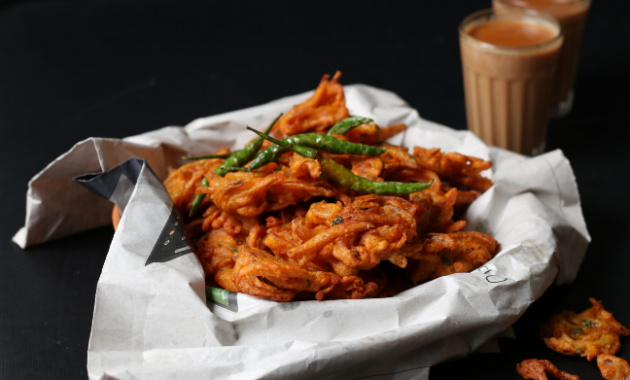
Monsoon brings relief from scorching heat but also increases the risk of waterborne diseases and food contamination. During this season, it is crucial to pay attention to our diet and make informed choices to stay healthy. Certain foods can pose a higher risk of infections and digestive problems during the monsoon. In this article, we will highlight five foods that are best avoided during the rainy season to reduce the chances of falling ill and ensure a healthy and enjoyable monsoon.
Here is a quick list of foods to avoid in monsoons.
Pani Puri/Gol Gappa/Puchkas: During the rainy season, it is recommended to avoid eating a particular savory snack due to the presence of dust, flies, and contaminated water at roadside stalls, which can increase the risk of diarrhea. Bacteria thrive in this season and can cause infections [1].
It is also advisable to consume only boiled and purified water, as even if the gol-gappa vendor uses bottled water for the pani, the ice may be made from a different source of water.
Fried Foods: Fried and oily food items (pakora, chaat, samosa etc.) can be heavy and slows down digestion, especially in the monsoon when your digestive system is sluggish [2]. They can lead to gastric issues and indigestion. Additionally, oily food can contribute to skin problems due to increased humidity.
Seafood: If you enjoy eating seafood, it is important to be cautious and reduce your consumption during the monsoon season due to the breeding season for sea creatures. This can lead to a scarcity of fresh seafood and an increased risk of consuming stale and contaminated food, resulting in food poisoning and stomach infections [3].
Pre-cut Fruits and Salads: Avoid consuming raw or chopped fruits that are exposed to the environment because there is a high chance of contamination from flies and pests. This can result in food poisoning and stomach infections [4].
Leafy Vegetables: Leafy green vegetables are highly nutritious, but it is not recommended to consume them during the rainy season due to the increased risk of germs and contamination. Vegetables grown in wetlands during this time can become dirty and storing them in unsanitary conditions can further raise the risk of infection. Therefore, it is advisable to avoid eating leafy vegetables during this period [5].
Maintaining a healthy diet is essential during the monsoon season to avoid falling ill and to enjoy the rainy season to the fullest. By avoiding certain foods that are more prone to contamination and spoilage, you can significantly reduce the risk of infections and digestive problems. Instead, opt for fresh, cooked meals prepared in hygienic conditions to keep yourself healthy and happy during the monsoon season.
(The article is reviewed by Monalisa Deka, Senior Health Content Editor)
References
1. Neelam Taneja and Abhishek Mewara. Shigellosis: Epidemiology in India. Indian Journal of Medical Research. Published online May 2016.
https://www.ncbi.nlm.nih.gov/pmc/articles/PMC4989829/
2. Tarek Mazzawi and Magdy El-Salhy. Effect of diet and individual dietary guidance on gastrointestinal endocrine cells in patients with irritable bowel syndrome (Review). International Journal Of Molecular Medicine. Published online 11 Aug. 2017.
https://www.ncbi.nlm.nih.gov/pmc/articles/PMC5593462/
3. From Monsoons to Microbes: Understanding the Ocean’s Role in Human Health.National Research Council (US) Committee on the Ocean’s Role in Human Health. Bookshelf ID: NBK230695
https://www.ncbi.nlm.nih.gov/books/NBK230695/
4. C L Little and I A Gillespie. Prepared salads and public health. Journal of Applied Microbiology. Published online April 2008.
https://pubmed.ncbi.nlm.nih.gov/18397258/
5. Birce Mercanoglu Taban and A Kadir Halkman. Do leafy green vegetables and their ready-to-eat [RTE] salads carry a risk of foodborne pathogens? Journal of the Anaerobe Society of the Americas and the Japanese Association for Anaerobic Infection Research. Published online Dec. 2011.
https://pubmed.ncbi.nlm.nih.gov/21549216/